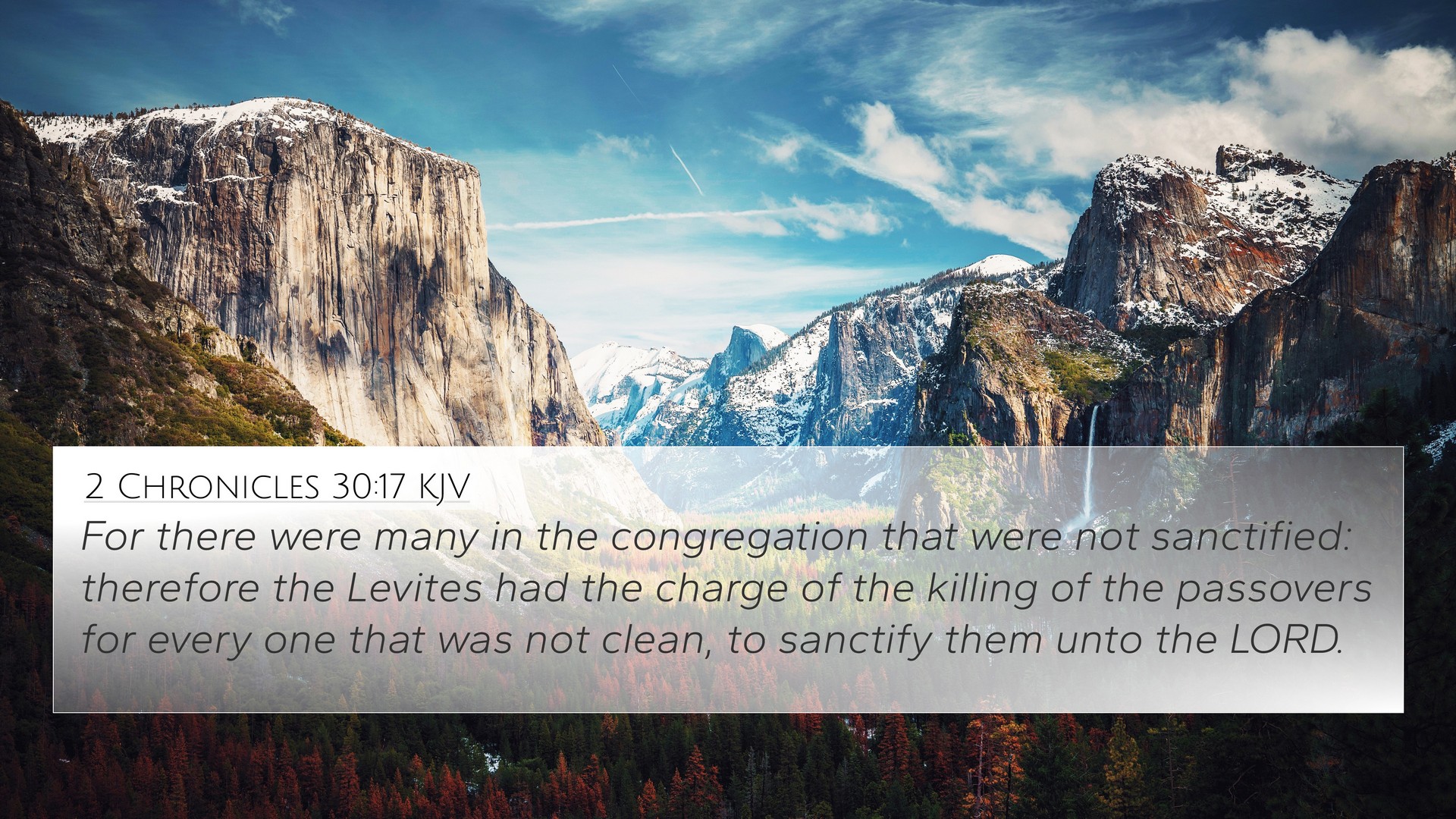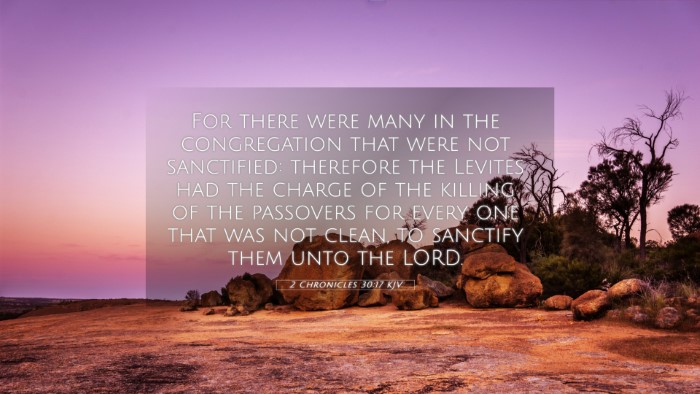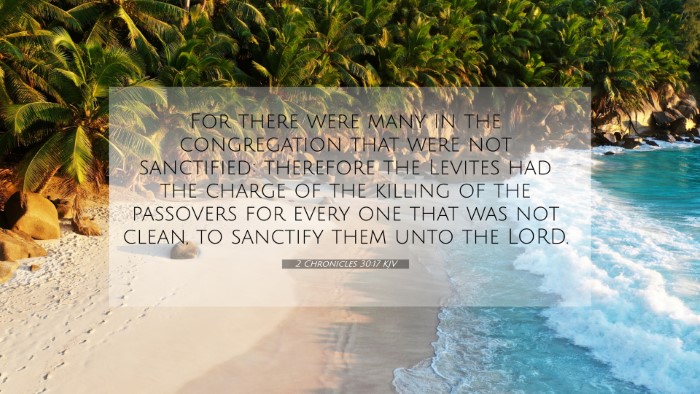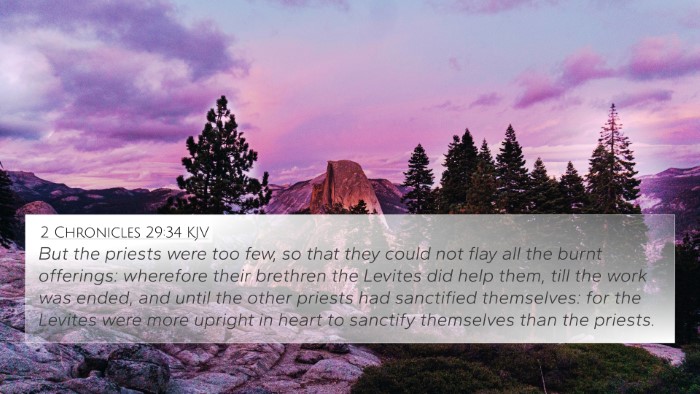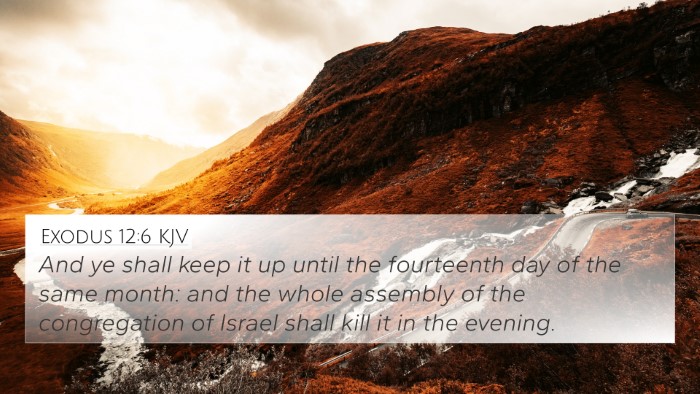Understanding 2 Chronicles 30:17
2 Chronicles 30:17 states: "For there were many in the congregation that were not sanctified: therefore the Levites had the charge of the killing of the passovers for everyone that was not clean, to sanctify them unto the LORD."
Overview of the Verse
This verse occurs within the context of King Hezekiah's efforts to restore the observance of the Passover in Judah. It highlights a significant issue regarding ritual purity and the role of the Levites in the sacrificial system.
Commentary Insights
The interpretations from various public domain commentaries provide a comprehensive understanding of this scripture.
-
Matthew Henry:
Henry notes the importance of sanctification, which was a prerequisite for participation in the Passover. He emphasizes that many in the congregation were not cleansed according to the ceremonial laws, hence they could not partake in the holy observance themselves. The Levites stepped in to perform the duties required for unclean individuals, reflecting their role as intermediaries in the process of sanctification.
-
Albert Barnes:
Barnes elaborates on the significance of the Levites in this context. He points out that their involvement signifies God's grace in facilitating worship even when the people fell short of the required sanctity. This act not only honored the Passover but underscored the importance of communal worship despite individual impurities.
-
Adam Clarke:
Clarke provides insight into the leadership role of the Levites, indicating that their actions were not merely functional but deeply relational as they exemplified servitude and dedication to God’s commandments. Clarke also discusses the theological implications of sanctions in worship, noting how divine grace allows for restoration.
Bible Verse Cross-References
Understanding this verse involves examining its connections to other biblical texts. Here are key cross-references:
- Exodus 12:3-6: Details the requirements for observing the Passover.
- Leviticus 11:44: Highlights the necessity of holiness among God’s people.
- Numbers 9:6-11: Discusses the provisions for unclean individuals in the observance of Passover.
- Deuteronomy 16:1-2: Reiterates the call to celebrate the Passover at its appointed time.
- 2 Chronicles 29:22-24: Chronicles the cleansing of the temple and subsequent sacrifices.
- Matthew 5:8: Jesus mentions the blessedness of the pure in heart, connecting to the theme of purity.
- Luke 22:15-16: Jesus discusses the Passover in the New Testament context.
Theological Emphasis
This verse and its interconnections underscore several theological themes:
-
Divine Grace:
The involvement of the Levites indicates God's grace towards those who genuinely desired to reconnect with Him, despite their imperfections.
-
Role of Intermediaries:
The Levites served as vital intermediaries, a theme that culminates in New Testament understanding of Christ as the ultimate mediator.
-
Importance of Ritual Purity:
Ritual cleansing was crucial in Old Testament worship, symbolizing the holiness required for approaching God.
-
Community Responsibility:
Collective worship is stressed, as the observance of Passover was a communal act, demonstrating that the purity of the community mattered to God.
Practical Application
The lessons from 2 Chronicles 30:17 can be applied today:
- The Need for Personal Holiness: Just as the Israelites were called to be sanctified, believers today are urged to pursue holiness in their lives.
- Community in Worship: This scripture encourages believers to support one another in faith and worship, recognizing the importance of communal integrity.
- Understanding Grace: It reassures us that while we may not always meet God’s standards, His grace allows us to approach Him through Christ.
Conclusion
2 Chronicles 30:17 serves as a profound reminder of the significance of sanctification, communal worship, and the grace of God manifested through the roles established in biblical times. Its connections to other scriptures provide a deeper understanding of how God's plans unfold throughout the Bible.
